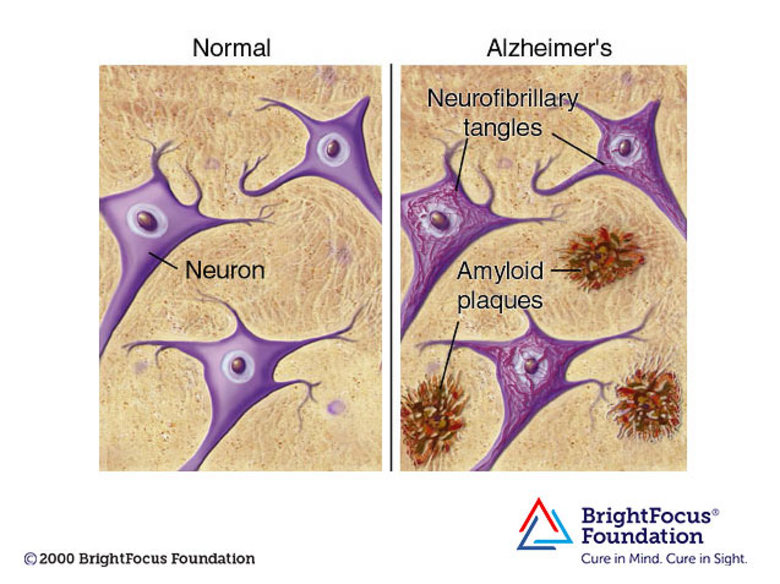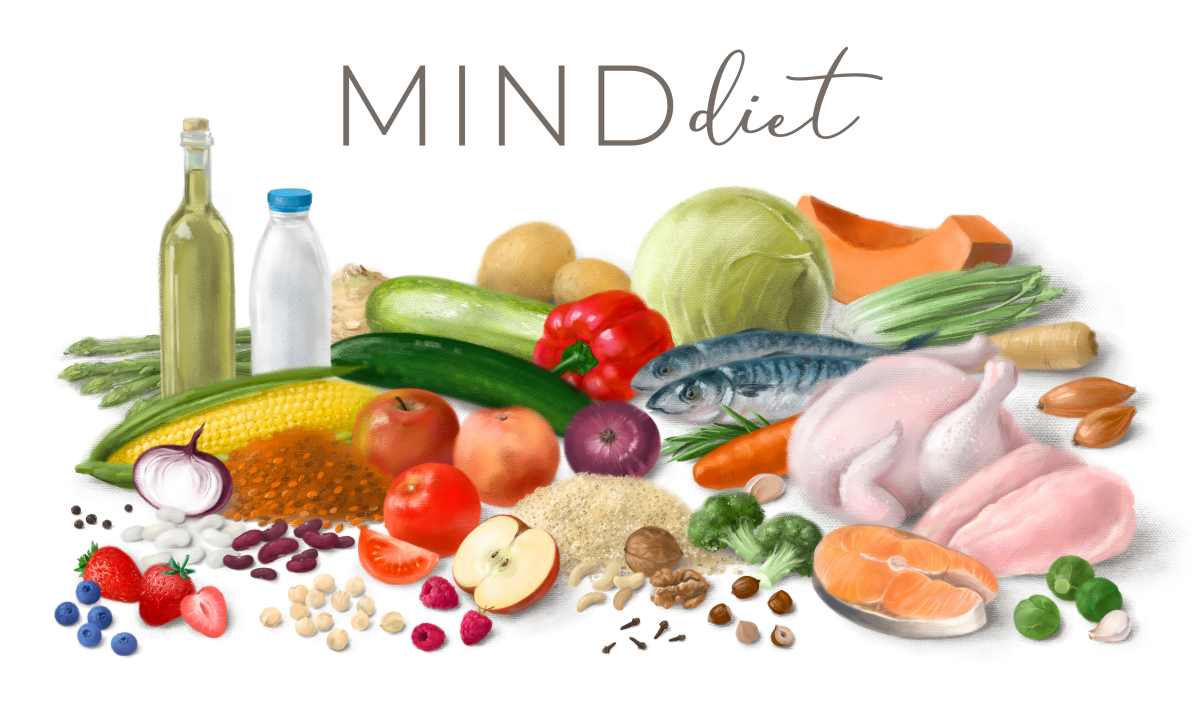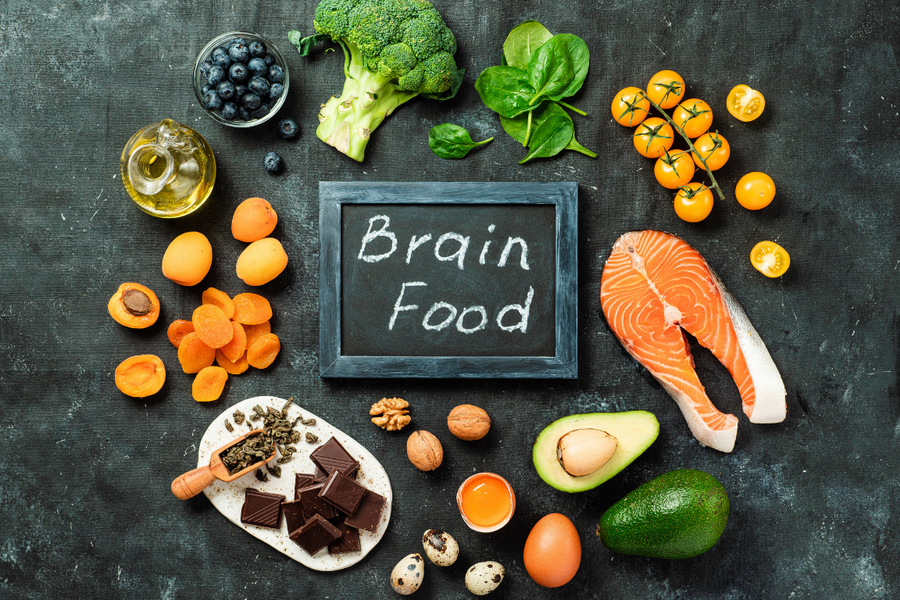What is Alzheimer’s disease?
Alzheimer’s disease (AD) is a neurodegenerative disease that causes the brain to shrink and brain cells to die. It is characterized by memory loss and decline in social skills and behaviors. Cognitive decline is gradual, so in the early years of AD, people may forget recent events or little details, but it can lead to declines in memory where people cannot do everyday tasks on their own. Around 6.5 million people living in the United States suffer from AD and it is projected to impact much greater numbers in the future. [1]
What is happening in the brain?
The exact cause of AD is not fully understood by scientists, but researchers have found two hallmarks of AD in the brain. One being beta-amyloid plaques which are clumps of fragments from proteins that block communication between cells in the brain. The other is neurofibrillary tangles made by tau proteins which also disrupt communication between cells but also cause damage to cells in the brain. [1]
 [2]
[2]
Insulin resistance and Alzheimer’s disease
Insulin signaling is important for regular neurological functioning; insulin improves things like memory and other cognitive functions. Insulin resistance refers to the brain’s decreased sensitivity to sensing insulin resulting in defects in insulin signaling. This could lead to an increase in neuroinflammation and oxidative stress which eventually lead to neurodegeneration. Insulin resistance and reduced insulin signaling is believed to cause the formation of the beta-amyloid plaques and neurofibrillary tangles that are believed to be the root cause of AD. [3]
How can diet prevent Alzheimer’s disease?
Eating healthy foods can prevent neuroinflammation and oxidative stress, which are risk factors for AD. A healthy diet can increase nutrient intake which can increase anti-inflammatory and antioxidant activity in the brain, protecting the brain against neurodegeneration. A healthy diet can also decrease the risk of developing diabetes, obesity, and heart disease which are found to be risk factors for developing AD. [4]
Mediterranean and MIND diets
The Mediterranean diet emphasizes the consumption of plant-based foods and healthy fats. Fruits and vegetables are essential to this diet as well as whole grains, fish, and unsaturated fats. The Mediterranean diet consists of low levels of red meats and sugars. The MIND diet is a spin on the Mediterranean diet with the DASH diet (diet to help treat and prevent hypertension). It has been found through studies that treating high blood pressure has positive effects in reducing the risk of dementia. The MIND diet is very similar to the Mediterranean diet but greatly emphasizes the intake of vegetables and fruits, but especially leafy greens and berries. Fish and whole grains are essential parts of the MIND diet as well as limiting the intake of red meat, cheeses, sugars, and fried foods. Studies on the MIND diet in relation to dementia and AD have shown that people who reported sticking to the MIND diet or the Mediterranean diet showed less evidence of beta-amyloid plaques and neurofibrillary tangles, and they found that it reduced the risk of developing AD by 53%. [5]
 [6]
[6]
What does this mean?
Specific diets could have a positive effect on retaining cognitive function and preventing the development of AD, but more research and evidence needs to be conducted to prove this for sure. What we do know is that having a healthy lifestyle which includes eating a healthy diet has been proven to prevent cognitive decline which could be related to the prevention of AD.
References
[1] Mayo Clinic. (2024, February 13). Alzheimer’s disease. Mayo Clinic. https://www.mayoclinic.org/diseases-conditions/alzheimers-disease/symptoms-causes/syc-20350447.
[2] Alzheimer’s Disease Research. (2015, July 1). Amyloid Plaques and Neurofibrillary Tangles. BrightFocus Foundation. https://www.brightfocus.org/news/amyloid-plaques-and-neurofibrillary-tangles.
[3] Akhtar, A. & Sah, S. P. (2020). Insulin signaling pathway and related molecules: Role in neurodegeneration and Alzheimer’s disease. Neurochemistry International, 135, 1-11. https://doi.org/10.1016/j.neuint.2020.104707.
[4] Stefaniak, O., Dobrzyńska, M., Drzymała-Czyż, S., & Przysławski, J. (2022). Diet in the prevention of Alzheimer’s disease: Current knowledge and future research requirements. Nutrients, 14(21), 4564. https://www.ncbi.nlm.nih.gov/pmc/articles/PMC9656789/.
[5] NIA. (2023, November 20). What Do We Know About Diet and Prevention of Alzheimer’s Disease? National Institute on Aging. https://www.nia.nih.gov/health/alzheimers-and-dementia/what-do-we-know-about-diet-and-prevention-alzheimers-disease.
[6] Fiorianti, K. (2023, February 27). The MIND Diet for Parkinson’s. Peterson Foundation for Parkinson’s. https://petersonforparkinsons.org/the-mind-diet-for-parkinsons/.
